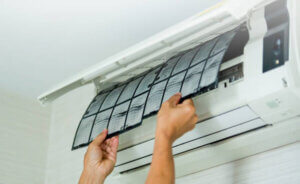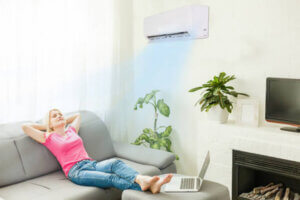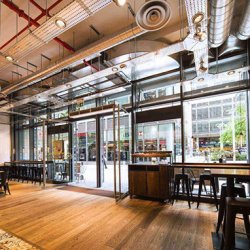
With the right knowledge, you can take steps to ensure that the air you breathe at home or work is healthy. You may wonder if you really need to make the effort to improve indoor air quality, but given how the quality of indoor air can have a substantial effect on your health and well-being, it is better to be safe than sorry.
Here are some of the known effects of indoor air pollutants:
- Cause eye, nose, and throat irritation
- Impair immune response and reduce the oxygen-carrying capacity of blood
- Trigger asthma and other breathing problems
- Weaken cognitive performance and mental health
- Have a bigger impact on those with respiratory conditions, cardiovascular diseases, or allergies
Fortunately, there are many ways to improve indoor air quality and help family members, employees, and patrons breathe healthy and easy. Read on to learn more about what you can do. Or contact the heating and air conditioning professionals at Galmiche & Sons to learn more about indoor air quality and how your HVAC system can help keep the air quality in your home or business in peak condition.
How to Improve Indoor Air Quality in Your Home or Business
There are some simple steps that you can follow to improve air quality throughout your home or commercial space. These include:
- Schedule Regular HVAC maintenance: Ensuring regular maintenance for your HVAC system is one of the most important things you can do to improve commercial or residential air quality. Comprehensive heating and air conditioner maintenance from Galmiche & Sons will ensure the health of your system, improve home air quality, and secure your health.
- Replace your HVAC filters: As a general rule, you should replace most air filters at least every 6-12 months. If you use your heating and cooling systems more heavily and have pets and/or allergy sufferers, filter changes should occur more frequently, ideally every 30 to 60 days.
- Check MERV ratings: Minimum Efficiency Reporting Value (MERV) ratings are an industry standard that measure the ability of an air filter to capture different-sized particles from the air. The rating scale ranges from 1 to 20. The higher the MERV value, the better the filter’s ability to trap dust and airborne particles. Filters with a MERV 16 or below are used for residential and commercial use. Filters of MERV 17 and above are used in laboratories, operating rooms, and other spaces where clean air is vital. Filters with a MERV rating between 8-13 will suffice for most homes and commercial buildings. A higher MERV rating will further improve indoor air quality but reduce airflow, thereby making the system work harder and increasing energy consumption.
- Use humidifiers: Dry air can worsen asthma symptoms, bronchitis, sinusitis and cause eczema flare-ups. By increasing the moisture level in the air, a humidifier creates a more comfortable environment for building occupants, particularly during the winter months. Commercial buildings and homes can use fan-powered or bypass humidification. The former can be mounted anywhere without the need for additional ductwork but as it has more moving parts, can break over time. The latter uses the natural airflow of a building’s HVAC system to humidify the air. It’s a low/no maintenance solution but requires space for ductwork.
- Install a carbon monoxide detector: The common causes of carbon monoxide leaks are incorrectly installed or poorly maintained household appliances like heaters, central heating boilers, chimneys, or other appliances that burn gas, oil or coal. A poisonous gas with no odor, carbon monoxide can be deadly. Installing a carbon monoxide detector and having all fuel-burning appliances in your home or building inspected by a qualified technician will help keep you safe. We can help you select a carbon monoxide detector for your home and perform HVAC maintenance to check for any issue that may prove risky in the future.

A few other ways to improve indoor air quality include:
- Do not block air vents or grills – this ensures proper performance of your ventilation system
- Avoid smoking in your home as well as burning candles that can release fumes into your home
- During renovation work, ensure that low-VOC paints, adhesives, flooring, and wood products are used
- Install an air purifier
- Bring as much fresh outdoor air into your home or building as possible
- Inspect your air ducts and vents for leakage, damage, or blockages
Contact Galmiche & Sons for HVAC Service in St. Louis
Our HVAC technicians have a long history of providing St. Louis home and business owners tips, recommendations, and guidance on improving indoor air quality. Make good choices, save more, and follow best practices with us. Call us at 314-993-1110 or use our contact form online to schedule your HVAC maintenance appointment or learn more.









